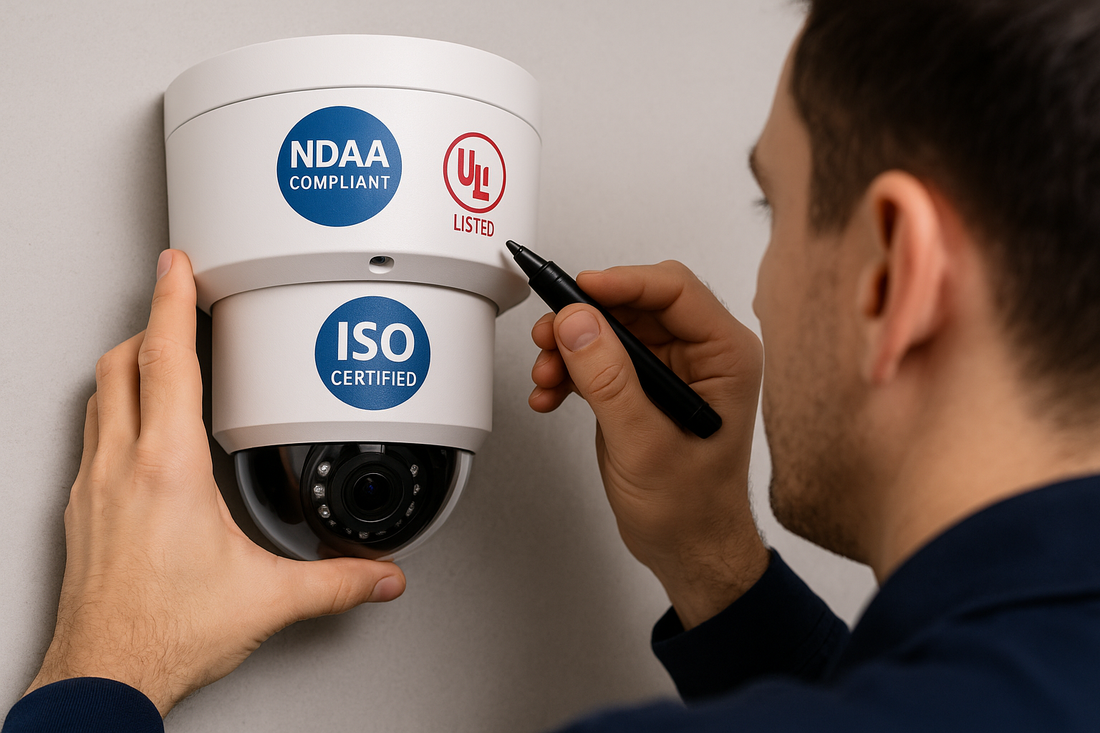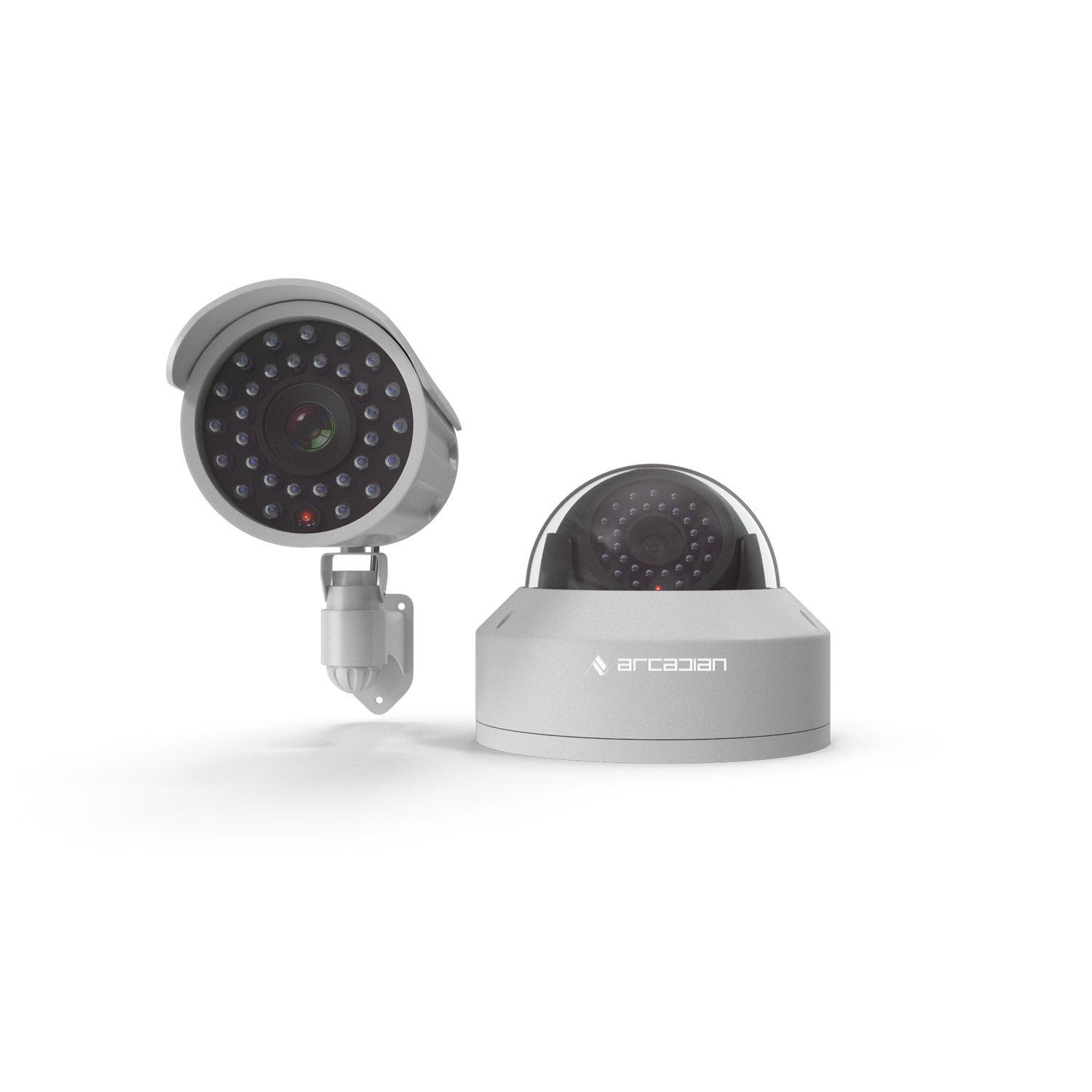CCTV Compliance 2025: The Truth About Certifications, Standards, and the Brands Falling Behind
Not all security systems are created equal. From NDAA bans to cybersecurity risks, here’s what compliance really means—and why it matters in 2025.

Introduction
In today’s surveillance-driven world, installing cameras is no longer enough. Whether you're managing a school, dispensary, warehouse, or retail chain, ensuring your video surveillance system meets the right certifications and compliance standards is critical—not just for safety, but for legal and financial protection.
Why does this matter? Because in 2025, government mandates, lawsuits, cyber breaches, and international sanctions are forcing businesses to rethink how their cameras operate, where they're manufactured, and how data is stored.
At ArcadianAI, we’ve built our cloud-native, AI-first platform to not only outperform legacy surveillance systems but also exceed today's growing compliance demands. Let’s dive deep into the certifications, privacy regulations, and cybersecurity standards that define modern surveillance—and expose which brands are keeping up (and which are falling dangerously behind).
Quick Summary / Key Takeaways
-
✅ NDAA compliance is mandatory for U.S. federal projects and many private contracts.
-
🔒 Cybersecurity standards like ISO/IEC 27001 and SOC 2 are critical for cloud-based video platforms.
-
⚖️ Privacy laws such as GDPR, CCPA, and PIPEDA now impact video storage, retention, and facial recognition use.
-
🚫 Many brands—including Hikvision, Dahua, and Uniview—are banned or restricted due to security risks and Chinese government ties.
-
💡 ArcadianAI offers a fully compliant, AI-powered, camera-agnostic platform trusted across regulated industries.
Background & Relevance
According to MarketsandMarkets, the video surveillance market is projected to reach $83 billion by 2028, up from $48 billion in 2023. Yet, most businesses don’t realize that deploying non-compliant systems—whether due to banned firmware, privacy violations, or poor cybersecurity—can expose them to:
-
Legal penalties
-
Security vulnerabilities
-
Loss of contracts (especially in public sectors or with regulated partners)
-
Reputational damage
Even more alarming: An IPVM report from 2024 revealed that over 60% of deployed commercial surveillance systems in North America were not fully NDAA compliant or lacked any form of cybersecurity auditing.
It’s no longer a technical issue—it’s a business risk.
Understanding Certifications and Standards in Video Surveillance
Global Certification Categories
NDAA Compliance (USA)
The National Defense Authorization Act (NDAA) prohibits U.S. federal agencies and contractors from using certain Chinese-made surveillance equipment.
🚫 Banned or Restricted Brands:
-
Hikvision
-
Dahua
-
Uniview
-
Huawei
-
ZTE
-
OEMs (e.g., Honeywell and Lorex rebranded some banned hardware)
✅ Approved Examples:
-
Axis Communications (Sweden)
-
Hanwha Vision (South Korea)
-
Bosch Security (Germany)
-
Avigilon (Motorola Solutions, Canada)
-
ArcadianAI (camera-agnostic, NDAA-certified integrations)
📖 Reference: U.S. Department of Defense – Section 889(a)(1)(B)
ULC and UL Certifications (Canada & USA)
-
ULC S304 and ULC-CAN/ORD C536: Required for alarm monitoring and video verification.
-
UL 2900: Cybersecurity assurance for connected devices.
-
Required for certification by monitoring centers, banks, cannabis sites, and critical infrastructure in Canada.
FCC and CE Certification
-
FCC Part 15: Ensures electromagnetic interference protection in the U.S.
-
CE Marking: Required for surveillance hardware in the European Economic Area.
-
Both are mandatory for legal distribution and often checked by customs/import compliance.
ISO Certifications
Key ISO standards in video surveillance and cybersecurity:
| ISO Standard | Description |
|---|---|
| ISO/IEC 27001 | Information Security Management (critical for VMS/VSaaS platforms) |
| ISO/IEC 27701 | Privacy Information Management (extension of ISO 27001) |
| ISO/IEC 30121 | Governance of digital forensics |
| ISO/IEC 15408 | Common Criteria for IT security |
ArcadianAI maintains compliance through encrypted cloud systems, regular penetration tests, and secure DevOps practices.
Cybersecurity Standards & Certifications
Cybersecurity Is No Longer Optional
In 2025, cyberattacks on surveillance systems have surged. From ransomware hijacking NVRs to botnets built on outdated IP cameras, the threats are real.
Top Standards to Know:
-
SOC 2 Type II – Framework for cloud system security, availability, and confidentiality. Required in finance, healthcare, and tech sectors.
-
NIST 800-53 & NIST CSF – U.S. cybersecurity frameworks adopted across federal and private sectors.
-
CIS Controls – Best practices for securing IT systems and surveillance infrastructure.
Real Case:
In 2023, a U.S. school district suffered a breach when their Hikvision DVR was hacked through a default admin password. The attacker gained live feeds from over 60 cameras across five schools.

Privacy Compliance by Region
Data Protection Laws You Must Understand
North America
-
CCPA (California Consumer Privacy Act): Affects any business collecting data from Californians, including surveillance footage.
-
PIPEDA (Canada): Requires consent and clear data retention policies for video surveillance in commercial settings.
📖 Office of the Privacy Commissioner of Canada
Europe – GDPR
-
GDPR fines have totaled €4.4 billion since 2018, including several for unlawful video recording.
-
Requires:
-
Explicit signage and consent
-
Data minimization
-
Right to deletion
-
Strict access control
-
Industry-Specific Regulations
| Industry | Key Regulation | Surveillance Implication |
|---|---|---|
| Cannabis (US/Canada) | Health Canada, state boards | Must store 30–90 days of footage, encrypted, accessible to regulators |
| Finance | FINRA, SOX | Secure audit trails for ATM/branch cameras |
| Healthcare | HIPAA | Cameras must not record private patient info |
| Education | FERPA, GDPR | Surveillance must protect student identity |
| Retail | PCI DSS, CCPA | Secure storage, POS integration, customer consent |
| Logistics/3PL | TAPA TSR | Must meet transport security standards, including video access protocols |
Comparisons & Use Cases
Table – Certified vs. Non-Compliant Brands (2025)
| Brand | NDAA Compliant | Cybersecurity Certification | Region |
|---|---|---|---|
| Axis | ✅ | ISO 27001, UL 2900 | Sweden |
| Hanwha Vision | ✅ | SOC 2, UL | South Korea |
| Verkada | ✅ (claimed) | Mixed | USA |
| Lorex | ❌ (OEM: Dahua) | Unknown | China/Canada |
| Hikvision | ❌ | ❌ | China |
| Dahua | ❌ | ❌ | China |
| ArcadianAI | ✅ | ISO-based, camera-agnostic, SOC 2-ready | USA/Canada |
Common Questions (FAQ)
Is NDAA compliance mandatory for all businesses?
No, but it's required for any U.S. federal, state, or local government projects and many enterprises with government ties.
Can I be fined for using non-compliant cameras?
Yes. Some cannabis licensees and financial institutions have lost licenses or faced penalties over footage issues.
How do I know if a brand is NDAA compliant?
Ask for a “NDAA Certificate of Conformance” or search IPVM and U.S. government vendor lists.
Does cloud storage violate privacy laws?
Not if it follows encryption standards, access controls, and regional data residency requirements (e.g., AWS Canada for Canadian data).
Is facial recognition legal?
Depends on the region. GDPR requires explicit consent. Several U.S. cities have banned it. ArcadianAI disables facial recognition by default.
Conclusion & Call to Action
Security is no longer just about watching video—it’s about accountability, transparency, and trust.
Businesses must go beyond hardware specs and pricing. Choosing surveillance systems in 2025 means evaluating:
-
✅ Legal compliance
-
✅ Cybersecurity safeguards
-
✅ Privacy protections
-
✅ Future-proof certifications
At ArcadianAI, we’ve built a fully compliant, cloud-native platform that works with 3,000+ camera models. Whether you’re a cannabis operator, school board, franchise owner, or SOC manager, we help you stay compliant, secure, and smart.
👉 Take the next step: Get a demo of ArcadianAI

Security is like insurance—until you need it, you don’t think about it.
But when something goes wrong? Break-ins, theft, liability claims—suddenly, it’s all you think about.
ArcadianAI upgrades your security to the AI era—no new hardware, no sky-high costs, just smart protection that works.
→ Stop security incidents before they happen
→ Cut security costs without cutting corners
→ Run your business without the worry
Because the best security isn’t reactive—it’s proactive.







